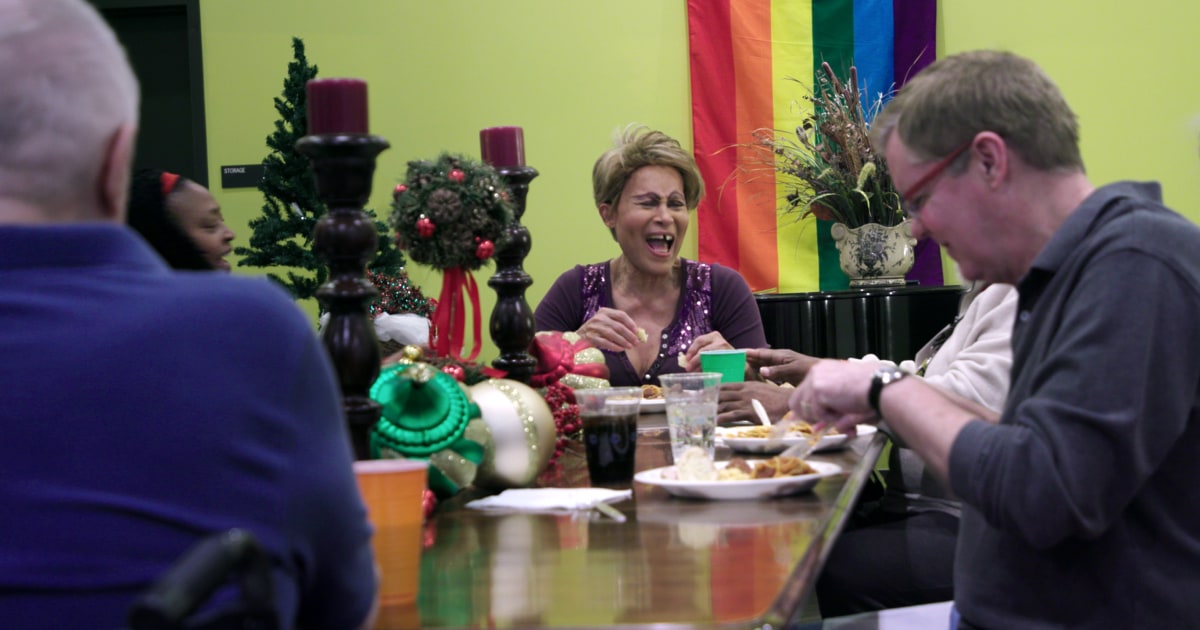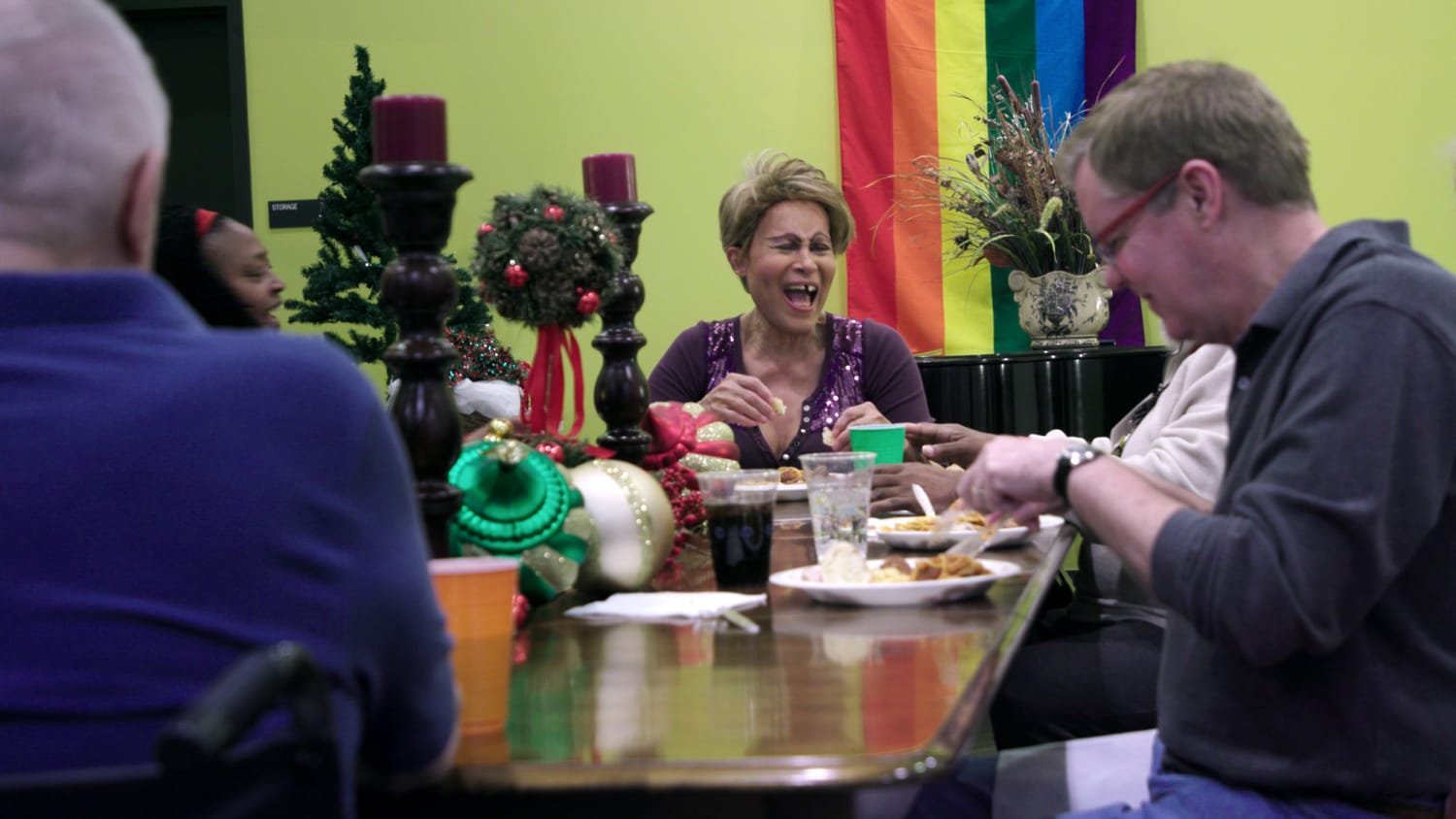
The phrase “Black transgender elder,” for some, remains unthinkable. Gloria Allen is living proof that it’s indeed possible.
Many Black transgender women expect to die young because they face disproportionate levels of discrimination and hate violence, giving way to an epidemic of murders that have cut them down in their prime.
Yet in the new documentary feature “Mama Gloria,” Allen, a 75-year-old Black trans woman in Chicago, testifies to the strength and perseverance of a community caught at the intersection of race- and gender-based oppression. Her narrative is one of surviving with grace and dignity, and a model of possibility for trans people when they are loved and affirmed by their families.
In the 1950s, before the LGBTQ rights movement as we know it became mainstream — and before the term “transgender” entered the cultural lexicon — Allen’s family was ahead of the curve. She had the backing of her mother (a Jet magazine centerfold model), grandmother (a seamstress) and aunt, all of whom noticed she was “different” at an early age and stood by her as she journeyed toward publicly transitioning during adulthood. Beyond moral support, they were hands-on, even helping her select attire that would flatter her figure and teaching her how to apply makeup.
Countless LGBTQ young people have experienced family rejection and trauma from religious bigotry, been kicked out of their homes and endured the harmful, disproven process of “conversion therapy,” an attempt to alter their identities toward being heterosexual or cisgender. But that wasn’t Allen’s reality while growing up.
“I didn’t have all the tools that they have out today for the younger people. So I had to do my thing, and I did it. I walked with my head up high due to my family,” Allen said, noting there weren’t any community centers or resources she could readily access about LGBTQ people. “I didn’t know anything about lesbians and gays, because we didn’t have any rights back then.”
“Mama Gloria” is deeply rooted in the Black experience. Allen came of age in a Black Chicago neighborhood, attended a Black church, became immersed in the early Black queer ballroom scene, and eventually took comfort in home gatherings with other Black LGBTQ people. As a child, Allen’s mother, Alma, wouldn’t allow her to visit relatives in the South, fearing for her safety after the 1955 lynching of Emmett Till, a 14-year-old Chicago boy who was accused of wolf-whistling at a white woman while visiting family in Mississippi. And by the time the 1969 Stonewall uprising in Manhattan put the fight for LGBTQ rights on the map, Allen was 23 and had already transitioned.
The film adds another layer of depth to both Black and LGBTQ history. Director Luchina Fisher noted that there aren’t many films about Black transgender elders. (One other notable example is the 2015 documentary “MAJOR!,” which features Miss Major Griffin-Gracy, an 80-year-old trans rights activist who was at Stonewall.)
Fisher said she hopes the documentary “stands the test of time, with people in 20 years or more looking at this film and really seeing the history of the community.” She added, “It shows a part of the Black community that we don’t often see, and it’s a counternarrative to the one that most widely exists — that Black families don’t support their LGBTQ family members.”
As a trans elder, Allen became passionate about mentoring and engaging LGBTQ+ youth. Nearly a decade ago, she started a charm school at Chicago’s Center on Halsted to educate trans youth about etiquette and proper behavior. The class inspired the 2015 play “Charm,” written by Philip Dawkins, which ran in Chicago, Minneapolis, Los Angeles, New York and Washington, D.C. She continues to reach out to younger people, supporting activists and sharing her firsthand perspective of Black and LGBTQ history with students.
“I’m so pleased with some of the younger generation, they’re doing a good job and I’m proud of them,” Allen said. “I’m still going to fight and be in their corner because, as my grandmother said, ‘It’s a poor wind that don’t change.’”
While primarily focusing on Allen’s direct testimony, the film interweaves her check-ins with youth she has mentored, a visit with high school classmates, a trip down memory lane with some of her family members, and a return to her childhood faith community, along with archival photos and footage.
“Mama Gloria” also sheds light on the vulnerabilities Allen experiences about aging as a trans person, as LGBTQ elders often encounter a number of barriers such as a lack of economic security compared to their cisgender, heterosexual counterparts, and limited networks of social support. According to research aggregated by the Movement Advancement Project and Services & Advocacy for GLBT Elders (SAGE), an LGBTQ elder advocacy organization, one-third of LGBTQ elders live at or below 200 percent of the federal poverty level. And by the year 2050, an estimated 40 percent of LGBTQ elders will be people of color.
But even with the disparities due to decades of discrimination, many LGBTQ elders like Allen, the report says, are “remarkably resilient” and represent living history, as they blazed the trail for the contemporary LGBTQ movement.
“They are a connection to the past, but they’re also the connection, I think, to the future,” said Fisher, a Black filmmaker who has a 16-year-old transgender daughter, Gia. “What I want her generation of young trans people to recognize, especially for Black trans women, is that you can have a full, long, meaningful life.”
“Mama Gloria” made its world premiere in October at the Chicago International Film Festival and has since earned accolades including the jury award for best documentary at the Teaneck International Film Festival, and best film at the Cineodyssey Film Festival. The film will also appear at several festivals in 2021, including the Denton Black Film Festival, which is scheduled for late January. With pandemic precautions in place, many upcoming film festivals have gone virtual, allowing anyone across the country to attend and participate.
“Mama Gloria” will make its television debut on PBS in April, and it will be available on the PBS streaming platform.
The documentary’s message strikes a heavy chord particularly because it arrives during what’s been the deadliest year yet for violence against transgender women of color. According to various LGBTQ advocacy organizations, at least 41 known killings have taken place in the United States in 2020 alone — with many more remaining unknown because victims were either misgendered by official reports, or the crimes have gone uninvestigated or unreported. Allen said she hopes the film will inspire people to continue fighting for trans rights, and encourage trans people to live their truths.
“I want the world to know I have a life, and I have a right to be here on this planet,” Allen said. “I’m happy to tell my story.”
Follow NBCBLK on Facebook, Twitter and Instagram.
Source: | This article originally belongs to Nbcnews.com









